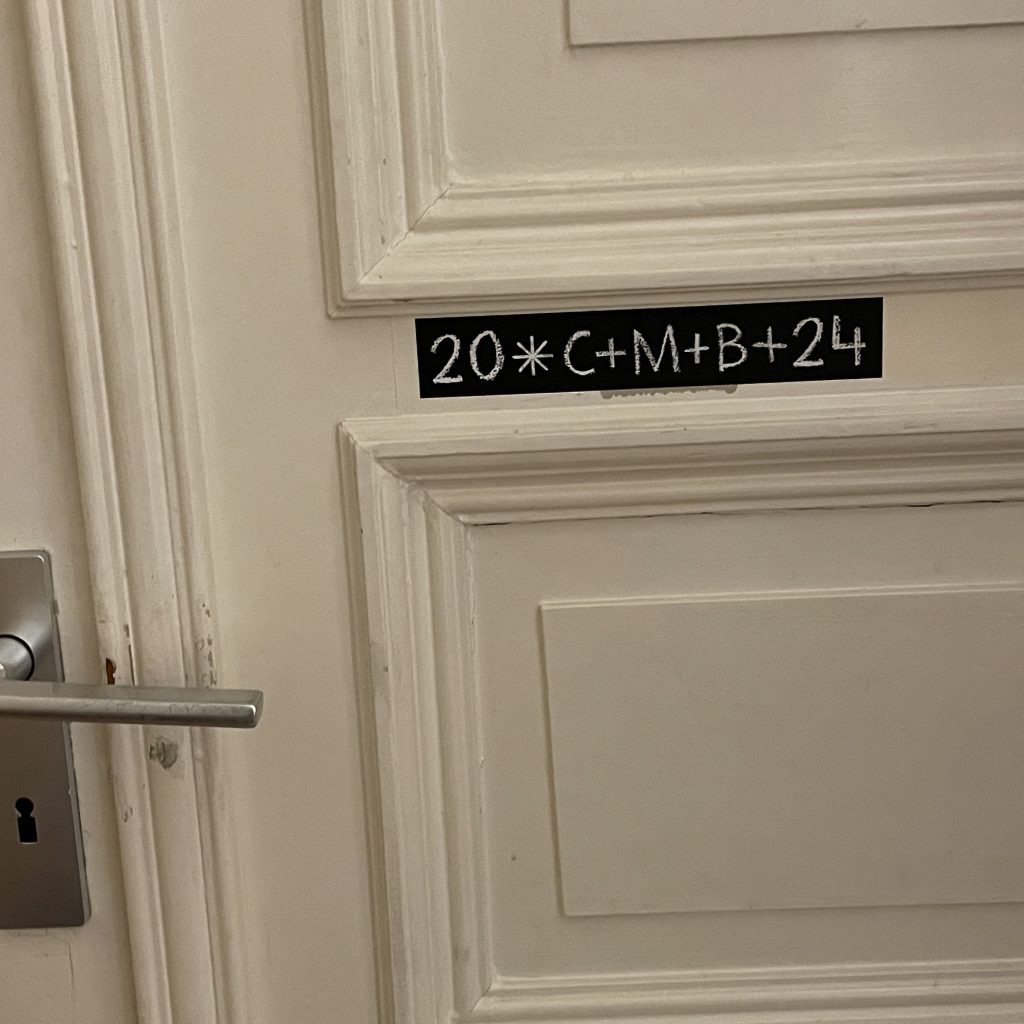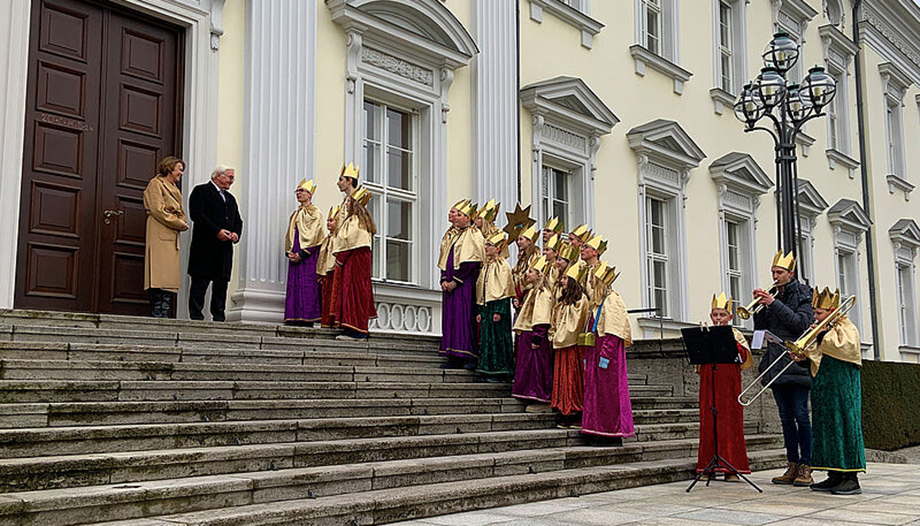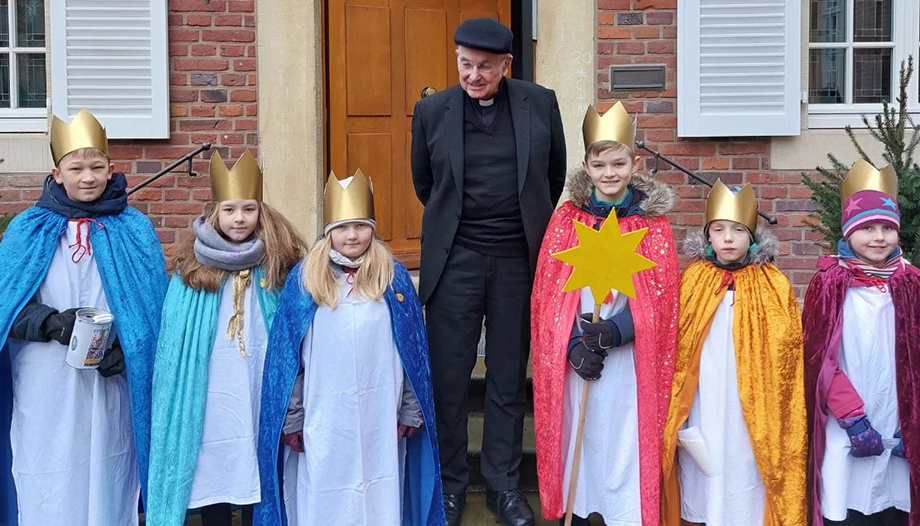We have seen them in the last few years in various media. Among the most widespread Christmas traditions in Germany, as well as in Austria and in the German-speaking Italian regions, the "Dreikönigssingen" (Singers of the Magi) or "Sternsinger" (Star Singers) stand out: around the feast of the Epiphany or Three Wise Men, children dressed as such and carrying the Star of Bethlehem go from house to house carrying the blessing, traditionally written with white chalk on the door. The inscription "Christus mansionem benedicat" ("Christ bless this house") also has the connotation of referring to the initials of the names of the Kings in German: Caspar, Melchior and Balthasar.


According to tradition, the blessing is written in a prearranged way: "20*C+M+B+24"; the asterisk symbolizes the star. It is part of the tradition that, in a blessing ceremony, the bishop or the parish priest sends the children, since each parish, besides the diocesan level, sends its own "Sternsingers". Lately, the Sternsingers carry the "blessing" prepared on adhesive. Afterwards, the inscription or the cartouche is incensed and the "Sternsingers" sing Christmas carols.
Origins of the tradition
This tradition dates back to the middle of the 16th century: the oldest document on this custom is a record from St. Peter's Abbey in Salzburg from 1541. It must have spread rapidly: in Wasserburg am Inn there are records of it in 1550, in Laufen and Eggenburg in 1552; in the Benedictine abbey of Ettal in 1569 and in Burghausen in 1577.
Since the middle of the 20th century, this tradition has been associated with Catholic Church campaigns to raise funds for development aid projects for needy children around the world. In Germany, since 1958 the campaigns have been coordinated by the Aachen-based children's missionary organization "Die Sternsinger" together with the German Catholic Youth Association (BDKJ).
Every year around 300,000 children in Germany participate, who in 2023 collected exactly 45,454,900.71 euros. Since its inception in 1958, an estimated 396 million euros have been collected, with which some 40,000 projects were financed.


One goal each year
In order to familiarize the participants in these campaigns with the living conditions of children in need, each year the Epiphany campaign focuses on a different theme and a different country.
The slogan of the 2024 campaign was: "Together for our Earth, in the Amazon and around the world". However, the donations are not only destined for this region, but for 1,179 projects to help children around the world, covering more than 90 countries, from Latin America to Oceania, as well as Eastern Europe, the Middle East and Asia.
Traditionally, the "Sternsingers" are received by the President of the Federal Republic, as well as by the Chancellor, by other members of the Federal Government in their ministries, by some of the Ministers-Presidents of the Federal States, and by some of the Ministers-Presidents of the Federal States. Länder and by mayors.
The Magi
The number three of the Magi refers to the gift of gold, frankincense and myrrh that the Magi offered to the Baby Jesus in Bethlehem.
Since about the 6th century they appear, for example, in the basilica of Sant' Apollinare Nuovo in Ravenna with the three classical names: Balthasar, Melchior, Gaspar; they have oriental features, accentuated by the Phrygian cap.
Already here there is a certain differentiation of ages. However, since Beda Venerable (VIII century) it is considered that they symbolize the three ages of man, as well as the three continents known until then: the oldest, Asia; the middle-aged, Europe; the youngest, Africa, although this one, in the history of Art, is not represented as black until the XVI century, approximately.
Although until not so long ago, one of the "wise men" used to paint his face black, as a consequence of the culture wokeThe practice has all but disappeared. However, this year, statements by Protestant theologian Sarah Vecera caused quite a stir in Germany: "For black people, it is hurtful that blackness is seen as a disguise and that white people paint their faces black," she said in a conversation with "Evangelischer Pressedienst (epd)".
Sebastian Ostritsch responded to this, for example, in "Die Tagespost": "To describe the depiction of a black king paying homage to Christ and handing out blessings to families as 'blackfacing' makes no sense for both historical-cultural and theological reasons. Historically and culturally speaking, 'blackfacing' refers to the 'minstrel shows' of the 19th century in the United States. In this form of theater, very popular at the time, blacks were portrayed by whites in a way that was not exactly flattering and loaded with negative stereotypes. However, the black among the Magi is placed in a completely different context: it is not about ridiculing blacks, but quite the opposite (...) The diversity of the Magi, which is also manifested in the color of their skin, makes it clear that all peoples without exception are invited to approach the Savior. While the culture woke preaches "diversity," in reality it only promotes a destructive egalitarianism. On the contrary, the Sternsingers reveal the glorious unity in diversity that we can find in Christ."
In 2015, the Sternsingers were included in the list of Germany's intangible cultural heritage.












